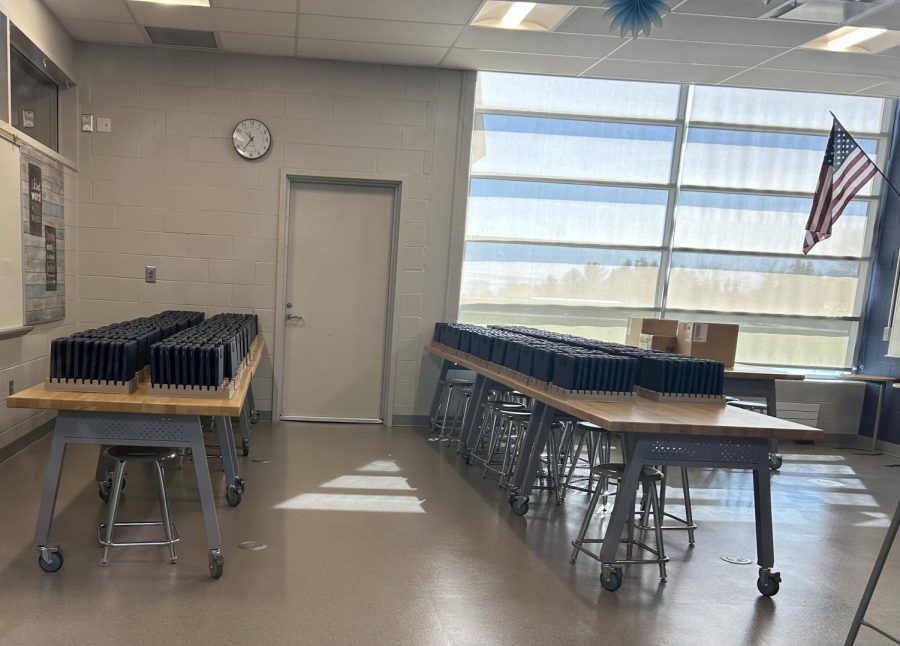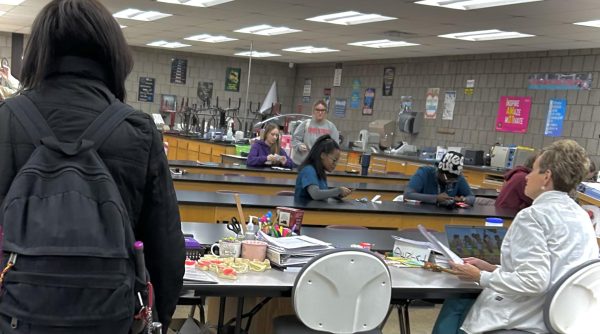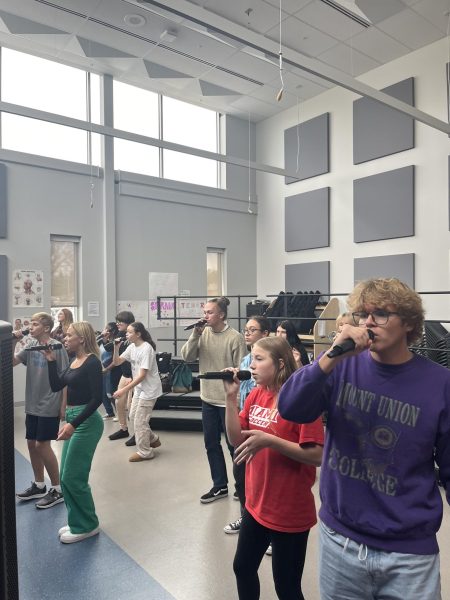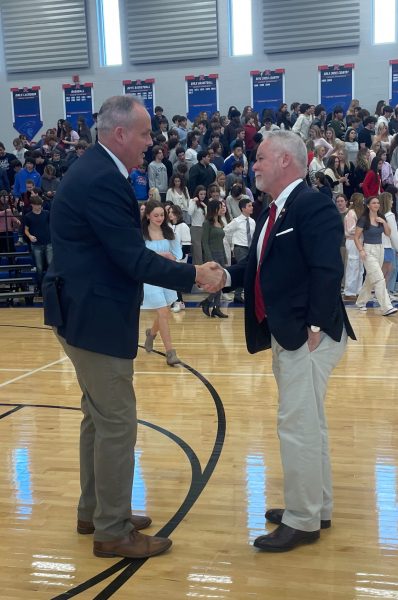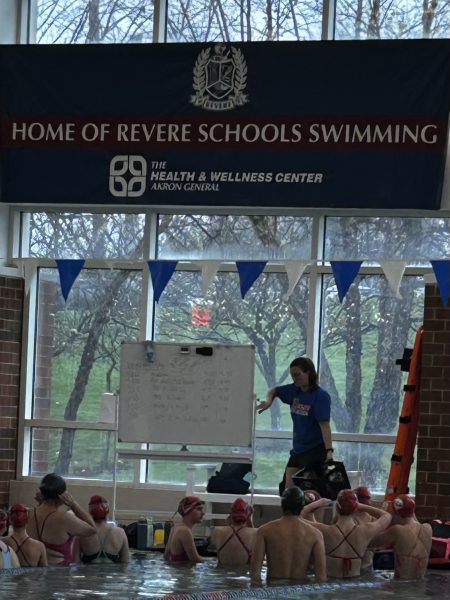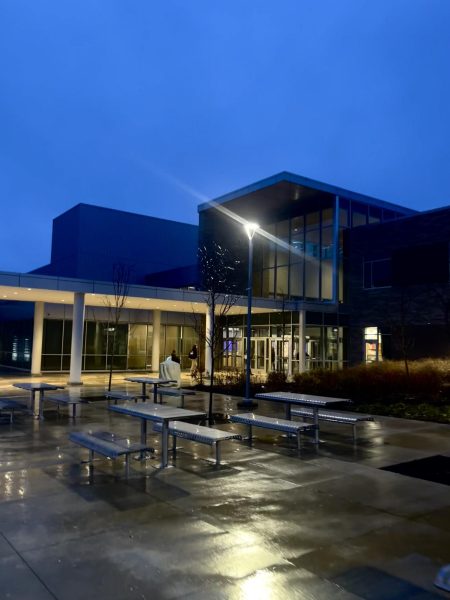District purchases new iPads for younger grades
The district prepares to enroll new iPads to the underclassmen.
Revere has started the process of distributing new 10th generation iPads for students currently in grades kindergarten through ten to replace the 6th generation iPads being currently used.
In 2018, Revere created a program called 1:1, which means that there will be an equal ratio of students in the district to the number of devices. Every student was assigned a 6th generation iPad. A survey was conducted in October among students and teachers to determine whether or not the iPads were meeting the learning needs expected.
The results of the survey showed that the 1:1 program is meeting the goals that the district wants to achieve.
Director of Technology John Schinker explained the goals achieved as shown by the 1:1 program through the survey.
“It’s helping make learning more interesting for our students, it’s helping [them] collaborate, it’s helping to show [their] learning in new and interesting ways instead of just taking tests all the time and it’s helping teachers better meet individual needs of their students,” Schinker said.
The survey helped to confirm that, overall, the 1:1 program is working and that the use of iPads throughout the district is beneficial.
“We heard that really across the board from our teachers K-12, from our parents and from our students in the high school and the middle schools,” Schinker said.
Superintendent Dr. Michael Tefs described an important question when it comes to providing technology to all students district wide.
“From a superintendent’s perspective, I think the big focus is, ‘How do we put devices into students’ hands that teachers are using as part of their curriculum so that it’s truly authentic and organic to learning?’” Tefs said.
However, there are mutual concerns shared by many about the current iPads. Schinker explained some of the negatives to the iPads the district had found from the survey.
“There are always downsides to technology, and some of the things that we heard regarding the downsides are some frustrations with overuse of technology, technology distracting people . . . .There was a lot of frustration with charging and keyboards,” Schinker said.
There will be adjustments to the 1:1 program to address these issues. Schinker explained some of the ways these issues will be attended to with the new iPads.
“The new iPads are very similar to the ones we have, but they’re faster and have more memory. They’ve made some changes and improvements to the cases to make them a bit more durable. We are also replacing the crayons because they have USB-C chargers instead of lightning chargers,” Schinker said.
The biggest complaint found from the survey was the current iPad cases. Parents had concerns about the current keyboards, but the survey results did not show as much concern from students. Principal Dr. Andy Peltz explained that there will be changes to the keyboards to help address these concerns.
“They did their best trying to find a keyboard that meets the needs of a high school student,” Peltz said.
Schinker explained that the iPad replacement process started two years ago and will continue on next year.
“We started two years ago with getting new devices for every kindergartener. The students in younger grades have newer iPads than [the older students] because we just started getting new ones every year. This year, we replaced all the iPads at Bath. In the spring we are intending to replace the iPads for ninth and tenth graders. In the fall we will replace the remaining grades in the middle school,” Schinker said.
Students currently in grades eleven and twelve will not be getting new iPads, as seniors are in their last quarter and juniors have one more year. The technology is suitable to last both grades until they graduate.
Peltz explained the lifespan of the iPads as pertaining to the current junior class.
“We had done a study that iPads can last five to seven years, and juniors . . . should have one or two more years left of life in their iPads,” Peltz said.
Since the 1:1 program was relatively new to Revere in the past few years, there was not much of a clear timeline of when devices were to be replaced as technology aged.
Tefs explained that without this new rotation, the district is tasked with buying 3000 new iPads at once every time they start to wear out.
“We bought all the iPads all at one time and there’s 3000 students . . . .When you buy them new, they all kind of [age] at the same time,” Tefs said.
Peltz explained what the new timeline of getting new iPads will look like.
“The rotation will always be that starting in eighth grade, since [iPads] have a five to seven year shelf life, students will get a new iPad in eighth grade . . . fourth grade and [kindergarten],” Peltz said.
With this rotation, it ensures that all students have access to an iPad that is within the five to seven year life span.
“[Students] will never be more than five years out of getting new and updated accessories,” Peltz said.
Revere will continue to provide new and updated technology for all students in the district on a new and more efficient replacement schedule.

